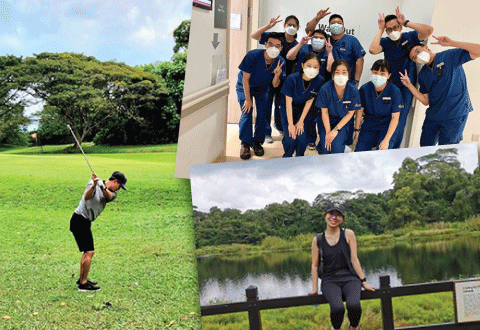
This year’s SingHealth Allied Health Day is very aptly themed #ActiveHappyPals (AHP i.e. Allied Health Professionals – get it? :D ). Besides going beyond their roles in responding to the pandemic-endemic, our teams of AHPs have also continued to do their best during this period to bring about safer diagnostic procedures and recovery journey for our patients.
Amidst all the hard work, our AHPs are a bunch of individuals who are believers of keeping active in body and spirit, and definitely seekers of joy at work! Have you spotted three of our NHCS campus visuals, Muhammad Khairulnizar Bin Azman, Nuclear Medicine Technologist from Nuclear Cardiac Imaging, Ketricia Lee Pei Ying, Cardiac Technologist from Cardiac Laboratory, and Del Fierro Romeo Jr Delica, Perfusionist from Perfusion, on our lift stickers and wall mural below?

Can you spot our NHCS AHPs in the above mural?
We chat with our three colleagues:
What is your work routine like?
Khairulnizar: Nuclear Medicine Technologists (NMT) prepare and administer radiopharmaceuticals, perform studies using gamma cameras for accurate diagnosis and research.
Ketricia: My work routine as a cardiac technologist starts with our daily huddle in the morning where we go through the patients scheduled for the day, and share updates or experience encountered at work. My role involves performing echocardiogram and stress echocardiogram on patients to detect abnormalities which aid in diagnosing structural or valvular heart disease.
Romeo: An open heart surgery requires blood to be rerouted outside the patient’s body through a heart and lung machine. My role as a perfusionist is to operate this machine – to monitor the patients’ ECG (electrocardiogram), blood pressure and temperature, as well as correcting blood gases and electrolytes, starting from commencement of a heart bypass until the patient’s heart is able to pump on its own after the operation.
Has there been an impactful moment in your career?
Khairulnizar: There was an incident where a patient was found crying prior to the test and we tried to console her but to no avail. After communicating with the patient, she revealed to me that she was feeling anxious due to personal problems which had caused her sleepless nights. Eventually, she felt better and managed to complete the test. I learnt that it is important to make an effort to actively listen, so that patients feel like a person and not just a test subject.
Ketricia: One of the biggest takeaway in NHCS is that other than having passion for the job, patient care and experience can be enhanced by showing empathy. One memorable encounter I had was with a young patient who had down syndrome. He was hospitalised and an echocardiogram was ordered for him. It was challenging to perform the test given his health condition. However, I managed to complete the procedure faster than expected, with great help from his caregiver. I was really impressed and admired the caregiver’s unconditional love and patience.
Romeo: As a perfusionist, I am able to help keep patients safe on the operating table until their recovery - this is one of my most rewarding experiences!
What’s the best and most challenging part of your job?
Khairulnizar: The best part of my job is the camaraderie among my colleagues. Nuclear Medicine is an exciting field that is always advancing, and with many opportunities for us to be involved in research studies. The vast and varied conditions that we attend to allow us to progress our knowledge, and knowing how we can contribute to their diagnostic pathways gives us satisfaction. Some common difficulties include interacting with challenging patients and those who are unfamiliar with the radiation source used in nuclear medicine. The former requires more time to communicate as it may affect workflow and delay other patient's scan times, while for the latter, we must be able to provide the necessary patient education as well as instructions to the care team while simultaneously triaging and understanding the disease processes being evaluated.
Ketricia: Being a cardiac technologist, I get to interact with people from all walks of life who share their life experience with me. It gets challenging when the cases are more complex as we will need more time to assess the patient, causing strain to our hand and lower back.
Romeo: The best thing about being a perfusionist is that I get to save lives whether it is a heart bypass or heart and lung transplant surgery, or using the Extra-Corporeal Membrane Oxygenation (ECMO) support - our patients’ lives and their care journey are partially in my hands. The most challenging part about this profession is being on call 24 hours a day as we need to respond to emergencies across the island that requires our expertise.
How do you handle stress at work?
Khairulnizar:

“Although it can be stressful at times, we can always count on each other in the department for support and assistance in times of need.” (Khairulnizar is second from right in the back row)
Ketricia:
“I handle stress either by doing things that I enjoy such as exercising and hiking, or rewarding myself with happy food like desserts.”
Romeo:
“A healthy amount of stress motivates me to be more efficient and prepares me to handle unexpected situations. That said, playing golf, and to be in touch with nature relaxes and calms my mind!”
Thank you all to all our AHPs for your incredible commitment and dedication, caring for our patients through your specialised skills and inspiring us with your zest for life!













 Get it on Google Play
Get it on Google Play